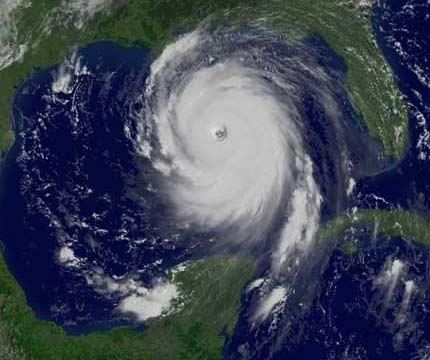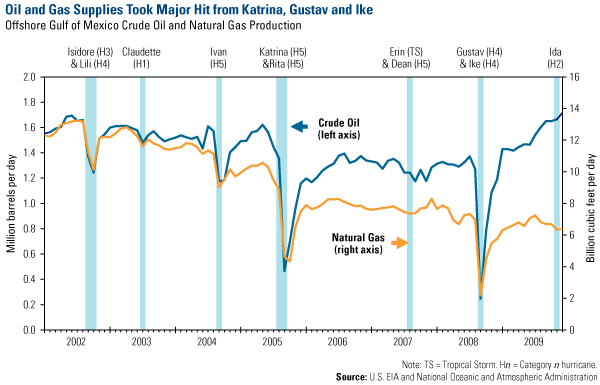 It’s officially hurricane season in the Atlantic, and another year of above-normal activity is expected. If the prediction from several well-known weather forecasters comes to fruition, the potential disruption of offshore oil production may add to already turbulent oil prices.
It’s officially hurricane season in the Atlantic, and another year of above-normal activity is expected. If the prediction from several well-known weather forecasters comes to fruition, the potential disruption of offshore oil production may add to already turbulent oil prices. The National Oceanic and Atmospheric Administration (NOAA) says due to a continuing high activity conditions, warmer water, and La Niña’s wind sheers, this season may produce 12 to 18 named storms, six to 10 of which could become hurricanes. Two or three of these hurricanes may be major. National Hurricane Center seasonal averages are 11 named storms, six hurricanes, and two major hurricanes.
And the more severe the storm, the more oil production is affected. As threatening weather arises, offshore energy companies suspend oil production to protect their facilities and employees. With damage to facilities from major hurricanes, there can be significant disruption to supply, thus causing an increase in oil prices.
Over the past several years, major hurricanes Katrina, Gustav and Ike wiped out substantial offshore natural gas and crude oil production in the Gulf of Mexico. In 2008, Hurricane Gustav, a Category 4 storm, caused 100 percent of Gulf crude oil and 95 percent of natural gas production to be temporarily shut in. Category 4 storms have winds up to 135 miles per hour and can cause a storm surge as high as 18 feet as they near the shoreline.
Hurricane Ike, another Category 4 storm, came through only weeks later. In total, almost 65 million barrels of crude oil and 400 billion cubic feet of natural gas supply were impacted by these two storms.

In contrast, 2009 was quiet, with only minor setbacks from Hurricane Ida affecting 2.5 million barrels of crude oil and 11.4 billion cubic feet of natural gas, according to the Energy Information Administration (EIA). Last year was an above-normal Atlantic season with 19 named storms, but the majority dissipated over the ocean.
These past two seasons have resulted in very little impact on commodities markets, giving investors what the Financial Times calls, “a false sense of security.”
Last year, we wrote about the effect an active hurricane season can have on oil prices (Read: “Extreme” Hurricane Forecast – Energy at Risk). We indicated that the Gulf Coast accounts for one quarter of U.S. oil production, 15 percent of domestic natural gas and 40 percent of the nation’s refining capacity. However, the warm, shallow waters of the Gulf make it a likely cauldron for summer hurricane activity.
With oil prices currently at high levels due to the Middle East unrest and the summer driving season upon us, oil prices could see another leg up if storms disrupt the Gulf’s supply.
Evan Smith, co-manager of the
Global Resources Fund (PSPFX), has first-hand knowledge of how dependent these oil and natural gas supplies are on the weather. See the photos he snapped while touring facilities in the Gulf of Mexico.Photo Slideshow - “Drilling in the Deep Blue Sea”
Please consider carefully a fund’s investment objectives, risks, charges and expenses. For this and other important information, obtain a fund prospectus by visiting usfunds.com or by calling 1-800-US-FUNDS (1-800-873-8637). Read it carefully before investing. Distributed by U.S. Global Brokerage, Inc.
Foreign and emerging market investing involves special risks such as currency fluctuation and less public disclosure, as well as economic and political risk. Because the Global Resources Fund concentrates its investments in a specific industry, the fund may be subject to greater risks and fluctuations than a portfolio representing a broader range of industries.